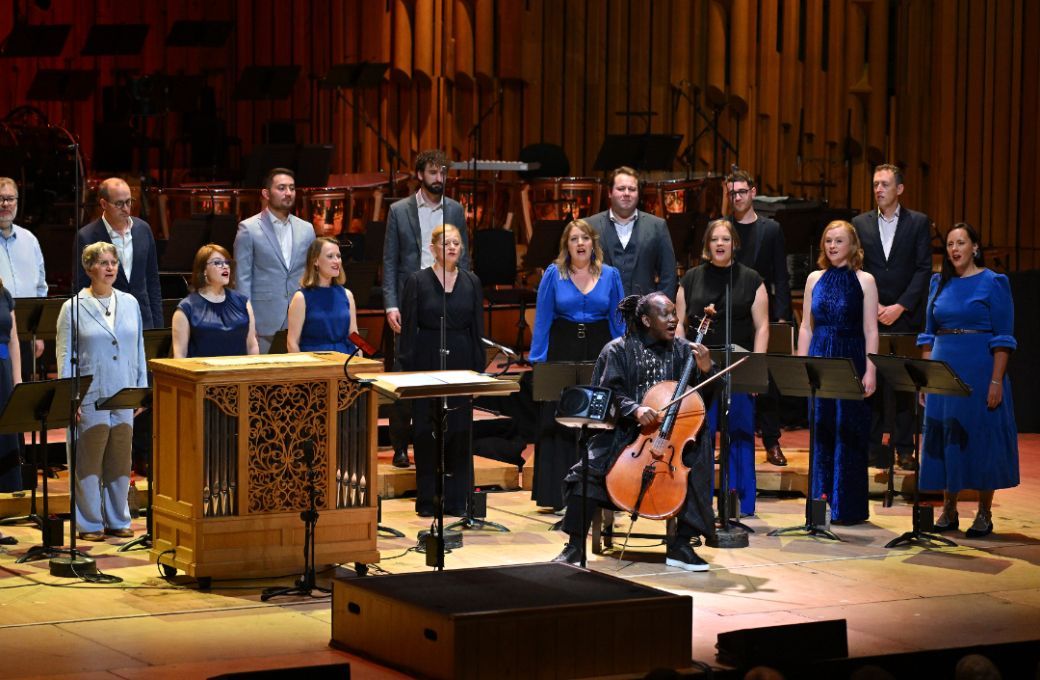We all know the BBC’s famous mission statement – and we’ll come to it – but last night’s centenary concert of one of the corporation’s crown jewels was a glittering celebration of joy, endurance and joining in. Georgia Mann and Clive Myrie, commentating from the stage for BBC Radio 3 listeners, didn’t mention Auntie’s recent unfortunate episode, the one called ‘nearly axing Britain’s best-loved choir’, after which the nation (and not just this one) raised its voice and saved them. But no-one could ignore the outpouring of affection, whoops, cheers and rapturous applause that greeted the BBC Singers on the Barbican Hall stage before a single note had been sung.

Chosen by the Singers themselves, the programme celebrated collaboration. The first half began modestly with a gentle, unfussy rendition of Bach’s Lobet den Herrn and quickly segued into cellist-vocalist Abel Selaocoe’s deliciously rich and mesmeric Nagula featuring the primal throat-singing of South Africa’s Xhosa people. The Singers were then joined by members of National Youth Voices in Shruthi Rajasekar’s joyful, synapse-busting glorification of every musician’s secret super power: counting. This fiendish exercise in concentration Numbers is so irresistible as an ear worm I am now going up and down stairs in binary form.
Hans Zimmer’s Chevaliers de Sangreal from The Da Vinci Code oddly saw Anna Lapwood confined behind what looked like an old cupboard and sounded disappointingly bunged up. Now that the BBC Singers are back in the room, it might be time for a refurb.
Composer in residence Eric Whitacre conducted his own luminescent Lux aurumque and Owain Park conducted Schoenberg’s Friede Auf Erden (Schoenberg guested with the Singers back in 1927) which ended the first half, lest anyone was getting complacent about the miracle that is this ensemble’s instinctively perfect intonation and emotional connection.
The first world premiere of the night, Roderick Williams’ triumphant choral and orchestral setting of the BBC’s royal charter, Inform, Educate, Entertain proved a brilliant expression of the symbiotic enrichment of the arts and public service broadcasting. Referencing Britten, Vaughan Williams, Tippett, Walton, Holst and doubtless more, this witty, Reithian march begins with every musician’s favourite joke, the simplest of ciphers, a fanfare of B B C, the minor 2nd an absolute gift of suspense and drama, which Williams deploys to great aplomb, with regular punctuations from the here-is-the-news timpani. More lyrical passages, tender, sweeping 1930s-style strings, suggest the idealism of the Corporation’s founders, while the simple genius of setting the word “incorporation” around a declamatory perfect fifth speaks of a commitment to openness and inclusion. Surely this wonderfully stirring charter cantata ought to be a shoo-in for the Last Night of next year’s BBC Proms and should definitely be a pop-up on the licence fee payment site. A section “Sing Joyfully” featured pre-recorded amateur voices from around the country in celebration of the United Kingdom’s diverse choral traditions.
And then there was Bernstein’s Chichester Psalms. Every note perfection. And so – via Anne Dudleys’ Decadence Waltz – to the final piece of the night and another premiere. Really, they were spoiling us. Iain Farrington’s On with the Show: a whistlestop tour of musicals did so much more than it said on the tin. Close harmony, scat, big-band imitation; there’s nothing the BBC Singers can’t do, even at the end of such a mighty programme. It was glorious.
Listen to the whole thing and listen again, as many times as your family will allow, because at its best, the BBC shows us the best of ourselves, and the BBC Singers – may they live long — give us many reasons to sing joyfully about it.


